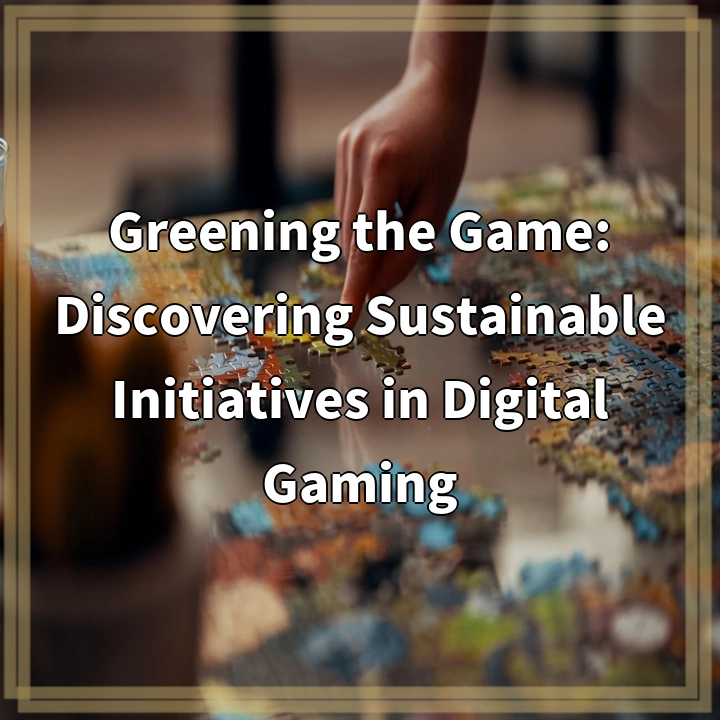
What it is:
In recent years, the digital gaming industry has seen a growing focus on sustainable initiatives to reduce its environmental impact. Greening the game refers to the efforts made by game developers, companies, and players to adopt more eco-friendly practices, technologies, and lifestyles within the digital gaming realm. These initiatives aim to address the environmental challenges posed by various aspects of the industry, including production, consumption, energy usage, and waste management.
Real-World Problems:
1. Energy Consumption:
The digital gaming industry’s energy consumption is a significant concern. As gaming technology advances and graphics become more realistic, the power demands of gaming consoles and gaming PCs continue to increase. This leads to higher electricity usage, resulting in a larger carbon footprint. The high energy consumption can contribute to climate change, exacerbating environmental issues.
2. Electronic Waste:
Digital gaming involves the production and consumption of electronic devices such as gaming consoles, PCs, and mobile devices. As technology advances, the lifespan of gaming devices becomes shorter, leading to increased electronic waste. Improper disposal of these devices can result in harmful chemicals and materials polluting the environment.
3. Supply Chain Impact:
The production and distribution processes of gaming hardware and accessories can have significant environmental impacts. From the extraction of raw materials to manufacturing and shipping, every stage contributes to carbon emissions, resource depletion, and waste generation. Additionally, the sourcing of rare materials for components can lead to environmental degradation and social issues in mining communities.
4. Carbon Footprint of Online Gaming:
Online gaming requires internet connectivity and server infrastructure, both of which have their environmental consequences. Data centers that host multiplayer games and online platforms consume vast amounts of energy for cooling and operation. Additionally, the players’ individual carbon footprints increase due to the electricity needed to power their gaming devices and the energy required for internet connectivity.
5. Lack of Awareness:
One of the challenges in greening the game is the lack of awareness among gamers and industry players. Many gamers are unaware of the environmental impact of their gaming habits or the potential for eco-friendly alternatives. Similarly, some game developers and companies may not prioritize sustainability due to limited knowledge or perceived lack of consumer demand.
Addressing these real-world problems requires collaboration among game developers, players, and industry stakeholders. By implementing sustainable initiatives, the digital gaming industry can reduce its environmental footprint and contribute to a more eco-friendly future.

Solutions to Greening the Game:
1. Energy-Efficient Hardware and Software:
Game developers can focus on optimizing their games to run efficiently on existing hardware, reducing the energy consumption during gameplay. Additionally, designing more energy-efficient gaming consoles, PCs, and mobile devices can help minimize the overall energy demands of the gaming industry.
2. Recycling and Extended Lifespan:
Implementing strategies for recycling and proper disposal of gaming devices can help reduce electronic waste. Game developers can encourage players to recycle their old devices or offer trade-in programs for upgrading to newer models. Promoting the concept of extended lifespan by providing updates and compatibility for older devices can also contribute to reducing electronic waste.
3. Sustainable Supply Chain:
Game developers and companies can adopt sustainable practices throughout the supply chain. This includes using ethically-sourced and recycled materials for hardware production, implementing energy-efficient manufacturing processes, and ensuring proper waste management at every stage of the production and distribution process.
4. Renewable Energy and Carbon Offsetting:
Transitioning to renewable energy sources, such as solar or wind power, for data centers and server infrastructure can significantly reduce the carbon footprint of online gaming. Additionally, game companies can invest in carbon offset projects to neutralize the emissions generated by gaming-related activities.
5. Educating and Engaging Players:
Raising awareness among gamers about the environmental impact of their gaming habits is crucial. Game developers and industry influencers can educate players through in-game messages, social media campaigns, and partnerships with environmental organizations. Encouraging eco-friendly gaming practices, such as powering devices with clean energy or participating in virtual reforestation initiatives, can further engage players in sustainable gaming.
By implementing these solutions and fostering a culture of sustainability within the digital gaming industry, we can work towards greener and more environmentally responsible gaming practices.















